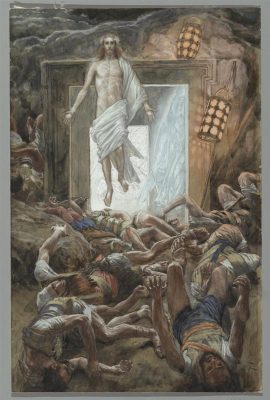 Roses and Lilies by Henri Fantin-Latour, public domain via
Metropolitan Museum of Art, Public Domain.
Roses and Lilies by Henri Fantin-Latour, public domain via
Metropolitan Museum of Art, Public Domain.
You probably know (if not, this is your last warning) that Lent begins tomorrow. Has Ash Wednesday crept up on you like it has on me? Or maybe you've got your plan already mapped out for the next forty days. There are all sorts of resources floating around the Catholic blogosphere right now to help you discern the how of Lent: the specific, personal ways you and your family should pray, fast, and give alms.
But as we enter into this season, let's not forget why we add a daily Rosary, give up sweets, or tithe more during Lent. These forty days aren't arbitrarily assigned - Holy Mother Church never acts randomly! Let's look a little deeper at the nature and purpose of penance in the Christian life, and explore why we practice it throughout these particular forty days.
[tweet "Why do we practice #penance during #Lent? @CatholicLitGeek explains how and why."]
In a strange way, Lent truly begins with Easter. If we want to understand the why behind the how of Lent, we have to work backwards from the why and how of the Resurrection.
 The Resurrection, James Tissot (Public domain via WikiArt)
The Resurrection, James Tissot (Public domain via WikiArt)
The Paschal Mystery, as the death and resurrection of Christ is called, culminates in that joyful morning of Easter Sunday. After three days of heartbreak and despair, the friends and family of Our Lord are greeted with the unexpected reality of their risen God. Consider the joy of the Blessed Mother, Peter, Lazarus! But beyond that natural joy, think about the unutterable rejoicing in heaven: at last, the path of salvation is opened for mankind!
But as always, a sublime paradox lies at the heart of the greatest feast of our liturgical year. Without the sorrow of Good Friday, the joy of Easter Sunday is irrelevant and fanciful. For the Resurrection to be accomplished, Christ first had to die; and this strange meeting of death and life accomplishes our salvation.
In paragraph 654, the Catechism of the Catholic Church explains,
"The Paschal mystery has two aspects: by his death, Christ liberates us from sin; by his Resurrection, he opens for us the way to a new life. This new life is above all justification that reinstates us in God’s grace, 'so that as Christ was raised from the dead by the glory of the Father, we too might walk in newness of life.' Justification consists in both victory over the death caused by sin and a new participation in grace."
That last sentence zeroes in on the two gifts that Easter offers us: victory over sin and participation in grace. Victory and participation involve activity on our part, however - without battle, there can be no victory, and without personal involvement, there can be no true participation.
How do we fight sin? How do we get involved with grace? The answer lies in another Catechism quote. In paragraph 1431 the CCC discusses interior repentance, which is defined as
"a radical reorientation of our whole life, a return, a conversion to God with all our heart, an end of sin, a turning away from evil, with repugnance toward the evil actions we have committed. At the same time it entails the desire and resolution to change one’s life, with hope in God’s mercy and trust in the help of his grace."
Clearly this "interior repentance" is the key to unlocking the gifts of Easter, but that list sounds like a tall order to me. All that reorienting, turning, and returning - getting dizzy yet? But the CCC takes the next few paragraphs to explain that interior repentance, or conversion, is expressed in "three forms, fasting, prayer, and almsgiving, which express conversion in relation to oneself, to God, and to others."
Here is the secret to Lent, then, entwined irrevocably with the mysteries of Easter. The forty days of penance and prayer which the Church assigns to us are meant to unlock our hearts and open them to the graces of the Paschal mystery. Our suffering unites us with Christ on the Cross, and in turn, He leads us to His Easter morning. Without Easter, Lent simply doesn't make sense. All our physical mortification, our extra prayer, our charity, has to be focused on the goal of participation in Christ's salvific plan for us, a plan which involves not only the walk to Golgotha but also the garden of the Resurrection.
Let's not forget Easter as we struggle to stay focused and motivated for the next forty days!
Copyright 2017 Rebecca Willen
About the Author

Rebecca W. Martin
Rebecca W. Martin, a trade book Acquisitions Editor for Our Sunday Visitor and Assistant Editor at Chrism Press, lives in Michigan with her husband and too many cats. A perpetually professed Lay Dominican, Rebecca serves as editor for Veritas, a quarterly Lay Dominican publication. Her children’s book Meet Sister Mary Margaret will release in fall 2023 from OSV Kids.


.png?width=1806&height=731&name=CatholicMom_hcfm_logo1_pos_871c_2728c%20(002).png)
Comments